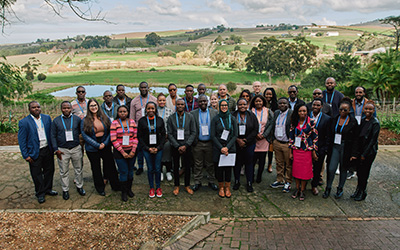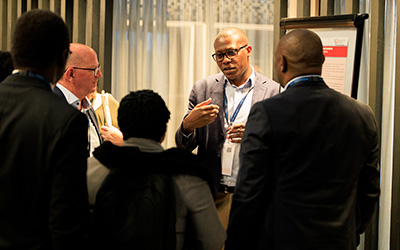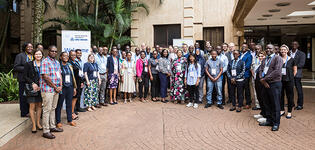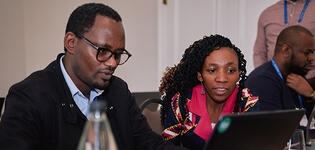Blog
Reforming taxation in Kenya to reduce debt distress
Improving tax systems is important for multiple reasons. For Kenya, finding ways to mobilize domestic revenue streams is critical to cutting the vicious cycle of indebtedness that keeps the country tied to external partners. Correct knowledge of the gaps in tax payment helps to identify solutions for gaining much needed financial autonomy.
Revenue is especially important to Kenya because its fiscal capacity is very low. To finance the infrastructure and other fiscal needs, my country has resorted to foreign borrowing, and this has led to a lot of external debt.
In its 8th Corporate Plan, the Kenya Revenue Authority (KRA) committed to improve tax compliance to bring more resources for financing the budget. In doing so, KRA aims to reduce the tax gap—by bringing the amounts of potential tax revenue and what is paid closer to each other— and achieve revenue growth above the nominal GDP growth. But until now, it has not been clear how big the gap for personal taxes is.
Taking new skills into use
I have worked for the KRA for the last 7 years—first as a Research Officer and then as a Research Economist. In 2022, I became one of the 27 participants of the UNU-WIDER Winter School on tax policy research.

In South Africa, amid the cold weather and vineyards, Ada Jansen from Stellenbosch University and Mazhar Waseem from the University of Manchester gave hands-on lectures on estimating the tax gap, referring to the South African and Pakistan personal income tax gaps respectively. From the lectures, I learned the different methodologies applied in estimating tax gaps, which include both the bottom-up and top-down approaches.
Before the training, I had a very limited knowledge of the estimation of tax gaps. However, upon return to Nairobi, together with my colleagues, I was assigned the task of estimating, for the first time, the personal income tax (PIT) gap in Kenya. This meant I had to apply in my context the skills I gained at the Winter School.
The study on the estimation of the personal income tax gap was part of the KRA’s research agenda for the fiscal year 2022/23. With support from the IMF, KRA had already estimated the value-added tax (VAT) gap and subsequently estimated the corporate income tax (CIT) gap.
Recommendations have already been taken up by the government
Our research shows that Kenya’s PIT gap is between 95% and 97%, so only very few Kenyans pay their personal income tax. This equals to between 2% and 4% of the GDP.
As recommendations to the government/KRA we advised them to create user-friendly forms and clear instructions that are tailored to the needs of self-employed taxpayers, simplify the regulations on self-employed individuals, as well as conduct a risk-based audit to identify the high-risk self-employed individuals who may be underreporting their incomes or engaging in tax evasion.
The recommendations are already taken up by the government, and some of them have been proposed to go into the next finance bill, towards reducing the gap and raising adequate revenue.

Attending the poster session at the WIDER Development Conference in Oslo in September 2023 was an eye-opening event. Engaging with scholars, professionals, and fellow researchers provided a unique opportunity to gain insights, exchange ideas, and fine-tune the study's recommendations. The talks were not only intellectually stimulating but also provided constructive feedback, prompting me to improve the soundness of the research.
The research is currently being discussed for publication in top development economics journals. While no final decision has been made, the goal is to increase the visibility and accessibility of the research findings.
Kenya is a member country in the Addis Tax Initiative (ATI), which is a multi-stakeholder partnership aiming to foster domestic revenue mobilization in partner countries. As an ATI member country, we are required to do tax gap studies, but only very few countries in Africa have looked at the personal income tax gap.
Domestic revenue mobilization will not happen by working alone
Collaboration and bringing in different partners are essential for solving the issue of low domestic revenue mobilization. The Winter School provided me with the necessary skills and networks to confront this situation. Presenting the findings of the Kenya PIT tax gap research at the WIDER Development Conference emphasised the value of collaborative efforts.
 The networks formed at the Winter School have set the path for ongoing collaborations with a variety of stakeholders, including government agencies and international organizations. Currently, we are undertaking collaborative research with for instance the African Economic Research Consortium (AERC) and the University of Copenhagen’s Development Economics Research Group (UCPH-DERG). I have also been nominated to attend an OECD workshop in Paris to share our insights on tax gap estimations.
The networks formed at the Winter School have set the path for ongoing collaborations with a variety of stakeholders, including government agencies and international organizations. Currently, we are undertaking collaborative research with for instance the African Economic Research Consortium (AERC) and the University of Copenhagen’s Development Economics Research Group (UCPH-DERG). I have also been nominated to attend an OECD workshop in Paris to share our insights on tax gap estimations.
The journey from Winter School to Oslo and beyond demonstrates the transformative power of collaboration in advancing efficient economic policy. Moving forward, the goal is to see Kenya's tax gap reduce in practice, for greater self-sufficiency and reduced reliance on external financing.
Clement Otindo is a Research Economist at the Kenya Revenue Authority. He attended the UNU-WIDER Winter School on tax policy research in June-July 2022 and WIDER Development Conference in September 2023.
The views expressed in this piece are those of the author(s), and do not necessarily reflect the views of the Institute or the United Nations University, nor the programme/project donors.
 Join the network
Join the network









